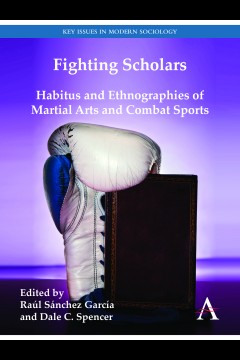Fighting Scholars
Habitus and Ethnographies of Martial Arts and Combat Sports
Edited by Raúl Sánchez García & Dale C. Spencer
- About This Book
- Reviews
- Author Information
- Series
- Table of Contents
- Links
- Podcasts
About This Book
‘Fighting Scholars’ brings to the fore the ethnographic study of combat sports and martial arts as a means of exploring embodied human existence. The book’s main claim is that such activities represent privileged grounds to access different social dimensions, such as emotion, violence, pain, gender, ethnicity and religion. In order to explore these dimensions, the concept of ‘habitus’ is presented prominently as an epistemic remedy for the academic distant gaze of the effaced academic body. The different contributions of this volume are aligned within the same project that began to crystallize in Loïc Wacquant’s ‘Body and Soul’: the construction of a ‘carnal sociology’ that constitutes an exploration of the social world ‘from’ the body.
The book is divided into three sections. In the first section, the editors introduce the field, providing a typology of existing literature. The second section contains the contributions of the authors, discussing their respective approaches to embodied ethnography, their use of the concept of ‘habitus’, and ethnographic findings. The third section contains a conclusion by the editors – reflecting on existing conceptions of ‘habitus’ and interdisciplinary possibilities for rethinking the concept – and an epilogue by Loïc Wacquant critically assessing the whole volume.
Reviews
‘“Fighting Scholars” is a groundbreaking contribution, combining empirically illuminating explorations of combats sports with methodologically innovative insights into embodiment and social research. With an acute sensitivity towards the social role of violence, gender relations and the cross-cultural transmission of leisure forms, this book underscores the transformative potential of both sports participation and the ethnographic experience.’ —Dominic Malcolm, Senior Lecturer in the Sociology of Sport, Loughborough University
‘“Fighting Scholars” presents a fresh, rich and inspiring look into the sociology and carnal ethnography of martial arts. Solidly founded on the deep academic knowledge and wide field experiences of thirteen contributors, it is a unique piece in the vast bibliography of the martial arts.’ —Carlos Gutiérrez-García, University of León, Spain, and Editor-in-Chief of the journal ‘Revista de Artes Marciales Asiáticas’
‘“Fighting Scholars” certainly extends in powerful fashion the martial arts / social science conversation, but it also does much more. Its movement across cultural, disciplinary and theoretical traditions of embodied knowledge invites profound refigurations of concepts like habitus and the cultivation of a real cumulative research program for carnal social science. Bravo.’ —Michael Kennedy, Professor of Sociology and International Studies, Brown University
Author Information
Raúl Sánchez García is associate professor in the Department of Theory, Organization and Recreation at the Universidad Europea de Madrid.
Dale C. Spencer is assistant professor in the Department of Sociology at the University of Manitoba.
Series
Key Issues in Modern Sociology
Table of Contents
Contributors; Glossary; Chapter 1: Introduction: Carnal Ethnography as Path to Embodied Knowledge – Raúl Sánchez García and Dale C. Spencer; Chapter 2: Habitus as Topic and Tool: Reflections on Becoming a Prizefighter – Loïc Wacquant; Chapter 3: In Search of a Martial Habitus: Identifying Core Dispositions in Wing Chun and Taijiquan – David Brown and George Jennings; Chapter 4: Each More Agile Than the Other: Mental and Physical Enculturation in ‘Capoeira Regional’ – Sara Delamont and Neil Stephens; Chapter 5: ‘There Is No Try in Tae Kwon Do’: Reflexive Body Techniques in Action – Elizabeth Graham; Chapter 6: ‘It Is About Your Body Recognizing the Move and Automatically Doing It’: Merleau-Ponty, Habit and Brazilian Jiu-Jitsu – Bryan Hogeveen; Chapter 7: ‘Do You Hit Girls?’: Some Striking Moments in the Career of a Male Martial Artist – Alex Channon; Chapter 8: The Teacher’s Blessing and the Withheld Hand: Two Vignettes of Somatic Learning in South India’s Indigenous Martial Art Kalarippayattu – Sara K. Schneider; Chapter 9: White Men Don’t Flow: Embodied Aesthetics of the Fifty-Two Hand Blocks – Thomas Green; Chapter 10: Japanese Religions and Kyudo (Japanese Archery): An Anthropological Perspective – Einat Bar-On Cohen; Chapter 11: Taming the Habitus: The Gym and the Dojo as ‘Civilizing Workshops’ – Raúl Sánchez García; Chapter 12: ‘Authenticity’, Muay Thai and Habitus – Dale C. Spencer; Chapter 13: Conclusion: Present and Future Lines of Research – Raúl Sánchez García and Dale C. Spencer; Epilogue: Homines in Extremis: What Fighting Scholars Teach Us about Habitus – Loïc Wacquant; References
Links
Stay Updated
Information
Latest Tweets



